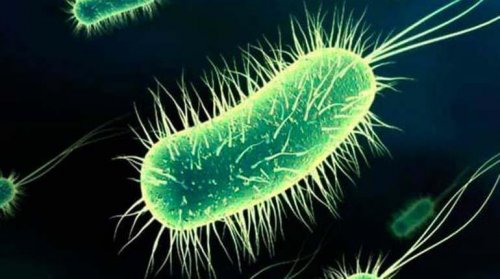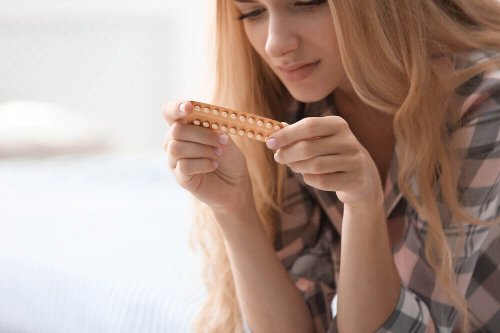The Causes of Cystitis After Having Sex


Written and verified by the doctor Leonardo Biolatto
Have you ever wondered why women get cystitis after having sex? Should you be concerned about it? Continue reading to find out more about this subject, perhaps you’ll find the answers to these and more questions.
This is a common condition among women, especially bacterial cystitis. This type is caused by a bacterial infection. According to health studies, 60% of women will suffer from it at least once in their lives. Within that group, up to 80% of cases are cases of cystitis after having sex.
What is cystitis?
Strictly speaking, it involves inflammation of the urinary bladder, no matter the cause. Most people believe that it’s the same as a urinary tract infection. However, it isn’t. Cystitis includes inflammation. However, a urinary tract infection involves the participation of a microorganism, most commonly bacteria.
Thus, we can classify this condition into two groups:
- Bacterial cystitis
- Noninfectious cystitis
Bacterial cystitis is caused by a microorganism, in most cases a bacterium (most commonly Escherichia coli). In these cases, the microorganism enters the urinary tract through the urethra. Then, it multiplies, forming bacterial colonies. This causes the symptoms of the condition.

Here are some of the causes of noninfectious cystitis:
- Foreign bodies: a urinary catheter or a catheter inserted into the urethra for a long period of time may lead to this condition
- Drugs: in addition, bladder inflammation is a side effect of some chemotherapy medications
- Chemicals: plus, certain substances in feminine hygiene products, such as feminine hygiene sprays or spermicidal jellies, can cause irritation
- Radiation: radiation therapy in women being treated for cancer may lead to it
- Interstitial cystitis: this is a chronic bladder inflammation without a clear cause. Naturally, that’s why it’s so difficult to treat.
- Other conditions: finally, certain diseases such as spinal cord conditions that cause “neurogenic bladder”
Cystitis after having sex
It’s scientifically proven that sex is a risk factor for cystitis in women. According to one study, women who have sex more than four times a month, use contraceptives, and have had sex in the last thirty days are more likely to develop cystitis.
Therefore, there’s a specific expression for this urinary tract infection linked to sex: postcoital cystitis. Also, the study identified at least five reasons why having sex can lead to urinary infections in women.
Oral contraceptives
These modify women’s menstrual cycle. They also modify hormones’ natural actions on the female body. Oral contraceptives weaken the lining of the urinary bladder – that is, the innermost part of the organ. This facilitates the colonization of bacteria such as Escherichia coli.

Condoms
The materials condoms are made of may also affect the mucosa of women’s urinary tract. This makes it more vulnerable to infections and facilitating the proliferation of bacteria. Nevertheless, it’s important to remember that not all bodies react the same way to these materials.
Read about Boldo, An Excellent Ally to Fight Urinary Conditions
The entry of bacteria
Sex favors the colonization of bacteria from the external environment into women’s urinary tract. In addition, the male penis may act as a carrier or the movements involved in the sexual act may lead to cystitis.
After-sex hygiene habits
One of the factors most linked to this problem and sex is women’s hygiene after sex. When women don’t urinate immediately after intercourse, the bacteria that entered are more likely to remain in the bladder and multiply.
Urethral trauma
Sex represents trauma to a woman’s urethra, which is very close to the vagina. The repetitive movements involved in the sexual act weaken women’s urinary tract, favoring the entry of external bacteria.
Discover how to How to Cure and Treat Cystitis with Home Remedies
Prevention of post-coital cystitis
As you can see, developing cystitis after sex is likely in women but it doesn’t mean you should abstain from it. Thus, it’s not necessary for you to stop having sex altogether out of fear of a urinary tract infection. This is because you can significantly reduce your chances of it if you’re careful.

The best tip to prevent cystitis after sex is to empty your bladder immediately after intercourse. This simple act transports the bacteria that might have entered the urethra and bladder.
Overall, it prevents bacterial colonization inside the urinary system. If possible, also empty your bladder before sex, as this also boosts the body’s defenses.
This simple tip should go hand in hand with proper hydration. Drinking the right amount of water stimulates urine production and facilitates urination during the day. This way, you prevent urine retention, which also favors cystitis.
All cited sources were thoroughly reviewed by our team to ensure their quality, reliability, currency, and validity. The bibliography of this article was considered reliable and of academic or scientific accuracy.
- Abelson, B., Sun, D., Que, L., Nebel, R. A., Baker, D., Popiel, P., … & Damaser, M. S. (2018). Sex differences in lower urinary tract biology and physiology. Biology of sex differences, 9(1), 1-13. https://bsd.biomedcentral.com/articles/10.1186/s13293-018-0204-8
- Heidemann, J., Kalder, M., & Kostev, K. (2022). Association between contraceptive use and risk of lower urinary tract infection (LUTI): a case-control study. International Journal of Clinical Pharmacology and Therapeutics, 60(4), 167. https://www.proquest.com/openview/c813eda24c13df1e3029162d3d8a1b2b/1?pq-origsite=gscholar&cbl=2044854
- Lo, C., Abraham, A., Bejan, C. A., Reasoner, S. A., Davidson, M., Lipworth, L., & Aronoff, D. M. (2023). Contraceptive exposure associates with urinary tract infection risk in a cohort of reproductive-age women: a case control study. The European Journal of Contraception & Reproductive Health Care, 28(1), 17-22. https://www.tandfonline.com/doi/abs/10.1080/13625187.2022.2156278
- Medina, M., & Castillo, P. E. (2019). An introduction to the epidemiology and burden of urinary tract infections. Therapeutic Advances in Urology, 11, 1756287219832172. https://journals.sagepub.com/doi/full/10.1177/1756287219832172
- Storme, O., Tirán Saucedo, J., Garcia-Mora, A., Dehesa-Dávila, M., & Naber, K. G. (2019). Risk factors and predisposing conditions for urinary tract infection. Therapeutic Advances in Urology, 11, 1756287218814382. https://journals.sagepub.com/doi/full/10.1177/1756287218814382
- Yoon, B. I., Kim, S. W., Ha, U. S., Sohn, D. W., & Cho, Y. H. (2013). Risk factors for recurrent cystitis following acute cystitis in female patients. Journal of Infection and Chemotherapy, 19(4), 727-731. https://pubmed.ncbi.nlm.nih.gov/23380970/
This text is provided for informational purposes only and does not replace consultation with a professional. If in doubt, consult your specialist.








